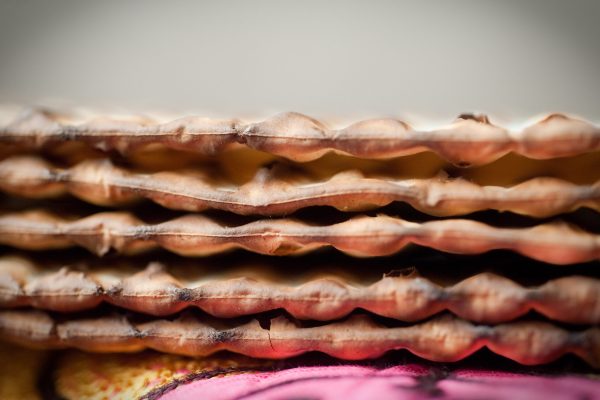For disabled Jews, chronically ill Jews, Unhoused Jews and anyone whose body or circumstances make traditional Pesakh preparation inaccessible.
There is an optional 30-second short version at the bottom.
This ritual can be done at any time in the days leading to Pesakh, or on Erev Pesakh itself.
Preparation (Optional)
If you’d like, gather:
If you’d like, gather:
-
A small piece of paper and pen
-
A crumb or symbolic object (like a small stone or piece of yarn) to represent hametz
-
A candle, LED candle, or other safe source of flame (if accessible)
-
A bowl of water (optional)
Step 1: Centering Intention
Take a moment to settle. Breathe in fully and release.
Say:
“I come to this moment with the body and breath I have today.
This, too, is holy.
My home is a home of dignity, even if I cannot sweep every corner.
My life is a life of wholeness, even if I cannot burn away the crumbs.”
This, too, is holy.
My home is a home of dignity, even if I cannot sweep every corner.
My life is a life of wholeness, even if I cannot burn away the crumbs.”
Simplified Meditation: Place your hand on your chest or belly. Feel the rise and fall of your breath. Imagine you are breathing out any stuck places, guilt, self-blame.
Step 2: Naming the Hametz
Take your piece of paper and write (or imagine) what feels like spiritual or emotional hametz right now:
-
What are you ready to release?
-
What burdens or crumbs are clinging to you?
-
What feelings of inadequacy, guilt, or comparison to others do you want to let go of?
Say:
“This is my hametz:
Fear, fatigue, guilt, judgment.
Expectations that no longer serve me.
I name them here with honesty, and with compassion.”
Fear, fatigue, guilt, judgment.
Expectations that no longer serve me.
I name them here with honesty, and with compassion.”
Step 3: Symbolic Release
Hold your object, crumb, or paper and say:
“As I release this hametz, I make space for freedom.
Not freedom of able bodies alone, but the freedom that belongs to all souls.
I am not bound by dust or dishes, by scrubbing or striving.
I am free because I am beloved.”
Not freedom of able bodies alone, but the freedom that belongs to all souls.
I am not bound by dust or dishes, by scrubbing or striving.
I am free because I am beloved.”
Options for release:
- If you have a safe flame: Place the crumb or paper carefully into the flame, watching it burn as you release your hametz.
- Tear the paper slowly and mindfully.
- Place the object gently in the bowl of water to symbolically dissolve it.
- Place the object in a special container or wrap it in cloth, and set it aside.
- Or simply imagine it floating away, carried by the wind.
If you have a candle, you may light it now (or turn it on) as a symbol of release and renewal.
Step 4: Affirmation of Freedom
Say:
“I am ready for Pesakh.
I cross the sea not with broom and brush, but with the strength of my spirit.
I leave behind the narrow places of guilt and impossibility.
My home is ready because my heart is ready.
My body is ready because it carries my soul.
And that is enough. More than enough. Dayenu.”
I cross the sea not with broom and brush, but with the strength of my spirit.
I leave behind the narrow places of guilt and impossibility.
My home is ready because my heart is ready.
My body is ready because it carries my soul.
And that is enough. More than enough. Dayenu.”
Step 5: Closing Blessing
Say:
“Blessed is the Holy One, who made me whole in the body I have,
who sanctifies me with mitzvot, and honors my effort.
Blessed is the Source of Compassion, who frees the captive,
who lifts up those bent low,
and who walks with me, exactly as I am.”
who sanctifies me with mitzvot, and honors my effort.
Blessed is the Source of Compassion, who frees the captive,
who lifts up those bent low,
and who walks with me, exactly as I am.”
Optional: Conclude with Shehekheyanu:
“Barukh Atah Adonai, Eloheinu Melekh Ha’olam,
shehekheyanu, v’kiyimanu, v’higiyanu lazman hazeh.“
shehekheyanu, v’kiyimanu, v’higiyanu lazman hazeh.“
Optional Short Version:
“I come to this moment as I am, and it is enough.
I name the burdens I release: [pause and name one or imagine].
I let them go, as surely as our ancestors left Egypt.
I enter Pesakh with dignity and freedom.










